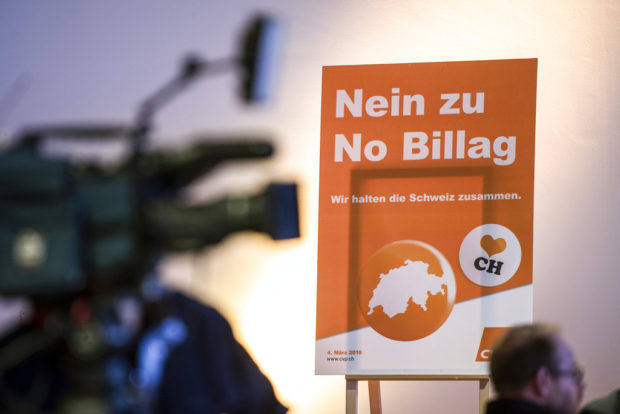Switzerland to vote on mandatory public TV fee as Europe watches

In this Jan. 27, 2018 file photo a poster against the ‘No Billag’ initiative is displayed at a meeting of the Christian Democratic party CVP in Bern, Switzerland. Swiss voters can decide in a referendum on March 4, 2018 on a proposal to stop the mandatory license fee for services of the Swiss Broadcasting Corporation. (Peter Schneider/Keystone via AP)
BERN, Switzerland (AP) — Voters in Switzerland are deciding whether they should have to keep paying hundreds of francs every year for public television and radio programming, a referendum that’s being watched closely elsewhere in Europe.
The vote to eliminate the mandatory national TV fee was sponsored by free-market proponents and other fee critics, who say residents shouldn’t have to pay for public broadcasting if they don’t watch or listen to it. The critics propose alternatives such as paid subscriptions for programming or say the publicly supported broadcasters should rely more on advertising.
Opponents of the “No Billag” vote — named for the company that collects the fees — argue that ensuring quality programming in an era of “fake news” and a sensationalized media landscape is in the public interest. Balloting concludes Sunday.
Polls last year suggested that most Swiss were ready to scrap the fees paid for by all households and Switzerland’s top-earning businesses, but more recent surveys indicated about two-thirds of voters will reject the proposal.
Supporters of fee-supported radio and TV stations have mounted a public relations blitz that all but painted Swiss culture as being at dire risk. They enlisted celebrities to push their message, warning that cherished news shows, music and film programming and free access to Olympics coverage could end.
Article continues after this advertisementBoth Switzerland’s parliament and its seven-member executive body, the Federal Council, back keeping the fee requirement.
Article continues after this advertisementThe issue resonates across Europe, where other fee-supported broadcasters have faced grumbling about mandatory charges.
Currently, Swiss households pay just over 450 francs ($480) per year. The fee is to decrease next year to 365 francs ($389), but the referendum is based on principle.
Defenders of the fees insist Switzerland needs to charge more because the country has a high cost of living and four national languages. Public broadcasters strive for balance and to make sure even the tiny Romansh-speaking community in southeast Switzerland gets time with German, French and Italian speakers.
“What would be obviously terrible is that the great moments that unite the country — I think of course the news, but also film, culture, and music production — all that will disappear,” said Gilles Marchand, director of SRG SSR, the parent company for publicly supported broadcasters that reaps 1.2 billion francs from the TV fees each year.
The initiative’s backers say it’s a question of free choice in a democratic society. By ending what they call a “quasi-monopolistic” Swiss broadcasting universe, families would have another 450 francs to spend.
The referendum’s organizers insist the aim is not to kill off public TV and radio, but open it to competition. While the initiative’s language does not mention SRG SSR and its affiliates, critics have taken shots at what they see as the overly high salaries of its executives.
“It’s fake news to say that ‘No Billag’ is the end of (German-language network) SRF and all the other medias, because we are sure that this company with 6,000 employees and a very good infrastructure can win in a free market,” said Christian Riesen, one of the leaders of the campaign against the fees.
Switzerland’s European neighbors will be watching the vote closely.
In Germany, each household is required to pay 210 euros ($260) a year, though some people get exemptions. The right-wing Alternative for Germany party has campaigned to abolish the fee, calling it a “compulsory tax” and accusing public broadcasters of being overfunded and spreading government propaganda.
Lower-cost Poland has radio and TV fees of about 5 euros a month ($74 a year) to pay for publicly-supported TV and radio, though people over 75 are exempt. But the government has struggled to get many people to pay and is working on a controversial bill to make the payments automatic.
People in the pricier Scandinavian countries of Denmark, Norway and Sweden generally pay the equivalent of about $300 and up a year for publicly supported broadcasting each year.
In Finland, households pay a special tax, based on income, of between 51 and 143 euros ($63 to $176) annually to support the national public broadcaster.
In Britain, television license fees vary but often are about 145 pounds ($200) a year. France, Ireland and Italy are among other countries that pay separately for publicly supported programming, while the Dutch pay indirectly through income taxes. NVG
RELATED STORIES:
Switzerland named world’s best country, US slips in new global ranking
Switzerland to return $320M stolen by Nigerian dictator